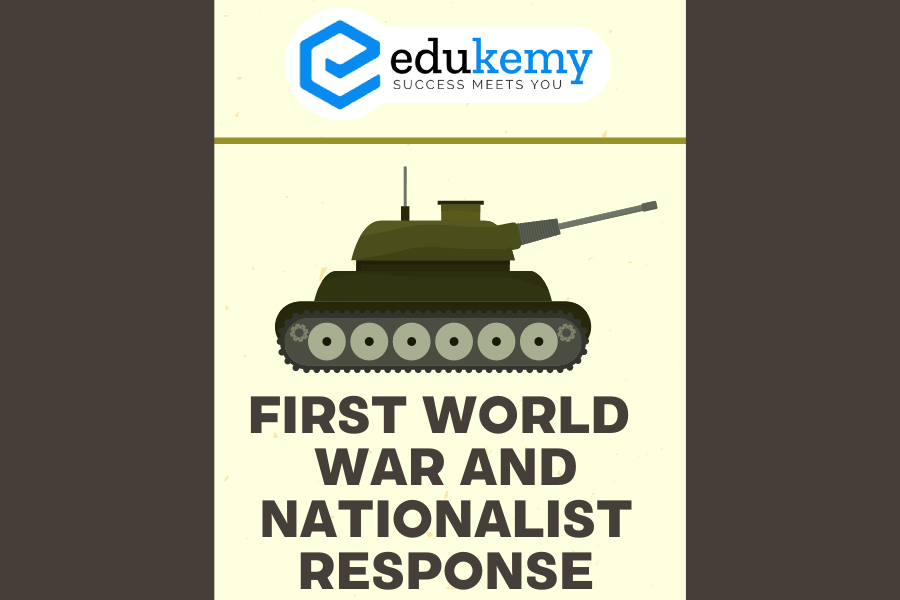
The First World War, spanning from 1914 to 1918, was a global conflict that reshaped the geopolitical landscape of the 20th century. Triggered by a complex web of alliances, imperial ambitions, and territorial disputes, the war engulfed nations across Europe, Asia, Africa, and the Americas in unprecedented violence and devastation. As the conflict unfolded, it sparked fervent nationalist responses from various countries involved, amplifying existing sentiments of patriotism, identity, and solidarity among their populations. These nationalist responses manifested in diverse forms, from recruitment drives and propaganda campaigns to resistance movements and demands for self-determination, profoundly influencing the course of the war and shaping post-war developments on both the global and local levels.
Contents
- 1 Moderates, Extremists, and Revolutionaries
- 2 Nationalist Perspectives
- 3 Revolutionary Activity
- 4 FAQs
- 4.1 Q: What were the main causes of the First World War?
- 4.2 Q: How did nationalism contribute to the outbreak of the First World War?
- 4.3 Q: What was the impact of the First World War on nationalist movements?
- 4.4 Q: How did the Treaty of Versailles influence nationalist responses?
- 4.5 Q: What role did nationalist leaders play in shaping the post-war world?
- 5 In case you still have your doubts, contact us on 9811333901.
Moderates, Extremists, and Revolutionaries
During the First World War (1914–1919), Britain formed an alliance with France, Russia, the USA, Italy, and Japan against Germany, Austria-Hungary, and Turkey. The nationalist response in India to British participation in the war was diverse:
- Moderates:
- The Moderates, representing a more conservative wing of the Indian National Congress, supported the British Empire in the war as a matter of duty.
- Their support was rooted in the belief that by backing Britain during the war, India would gain goodwill, and in return, the British might consider granting self-government to India.
- Extremists:
- The Extremists, including leaders like Bal Gangadhar Tilak (who had been released in June 1914), also supported the war efforts. They believed that India’s loyalty to Britain during the war would be reciprocated with constitutional concessions.
- This support was based on the mistaken belief that British gratitude for Indian cooperation during the war would translate into a commitment to self-government.
- Revolutionaries:
- The revolutionaries, however, saw the war as an opportunity to wage a direct war against British rule and liberate the country.
- Groups like the Ghadr Party in North America and the Berlin Committee in Europe played significant roles during this period. They sought support from Germany and Turkey, enemies of Britain, with the hope of financial and military assistance.
Nationalist Perspectives
- The Indian supporters of British war efforts failed to grasp that imperialist powers were primarily fighting to safeguard their own colonies and markets.
- The revolutionaries saw the War as a strategic opportunity to weaken British control over India, considering the drain on British resources and the potential for external support.
Revolutionary Activity
- The Ghadr Party in North America, the Berlin Committee in Europe, and scattered mutinies by Indian soldiers, such as the one in Singapore, were manifestations of revolutionary activity during this period.
- The revolutionaries aimed for immediate and complete independence, viewing the War as a chance to exploit Britain’s vulnerabilities.
This period marked the maturing of Indian nationalism, with different factions within the nationalist movement responding to the global conflict in varied ways. The aftermath of the War would see significant political developments in India, including the Jallianwala Bagh massacre and the emergence of Mahatma Gandhi’s non-cooperation movement.
FAQs
Q: What were the main causes of the First World War?
A: The main causes of the First World War include militarism, alliances, imperialism, and nationalism. These factors created a tense environment in Europe, leading to the assassination of Archduke Franz Ferdinand of Austria-Hungary in 1914, which triggered the outbreak of war.
Q: How did nationalism contribute to the outbreak of the First World War?
A: Nationalism played a significant role in the outbreak of the First World War by fueling rivalries and tensions between nations. Strong nationalist sentiments led to aggressive competition among European powers, as each sought to assert its dominance and expand its territory, ultimately contributing to the escalation of conflicts.
Q: What was the impact of the First World War on nationalist movements?
A: The First World War had a profound impact on nationalist movements worldwide. In some cases, it bolstered nationalist sentiments as people sought self-determination and independence from colonial powers. Additionally, the war weakened empires such as the Austro-Hungarian, Ottoman, and Russian, creating opportunities for nationalist movements to gain momentum and achieve their goals.
Q: How did the Treaty of Versailles influence nationalist responses?
A: The Treaty of Versailles, which formally ended the First World War, significantly influenced nationalist responses. It imposed harsh penalties on Germany, including territorial losses and reparations payments, which fueled resentment and nationalist sentiments within Germany. This contributed to the rise of extreme nationalist movements like Nazism, leading to the outbreak of the Second World War.
Q: What role did nationalist leaders play in shaping the post-war world?
A: Nationalist leaders played a crucial role in shaping the post-war world by advocating for self-determination and sovereignty for their respective nations. Leaders such as Woodrow Wilson, with his Fourteen Points, and nationalist figures like Mahatma Gandhi and Mustafa Kemal Atatürk, advocated for the rights of colonized peoples and contributed to the dismantling of empires and the emergence of new nations.
In case you still have your doubts, contact us on 9811333901.
For UPSC Prelims Resources, Click here
For Daily Updates and Study Material:
Join our Telegram Channel – Edukemy for IAS
- 1. Learn through Videos – here
- 2. Be Exam Ready by Practicing Daily MCQs – here
- 3. Daily Newsletter – Get all your Current Affairs Covered – here
- 4. Mains Answer Writing Practice – here

